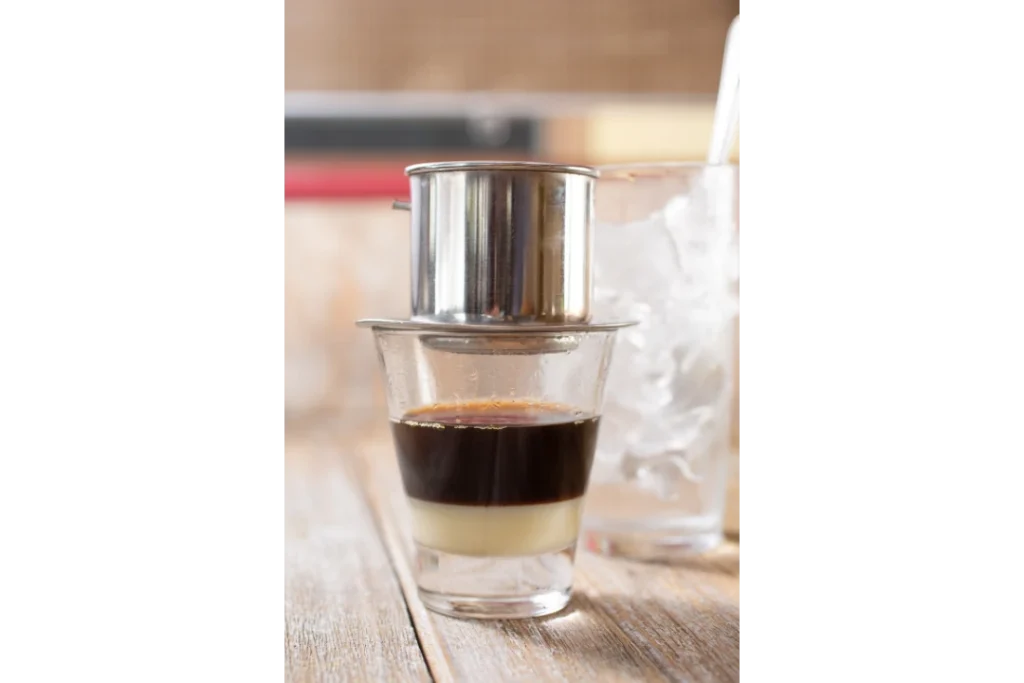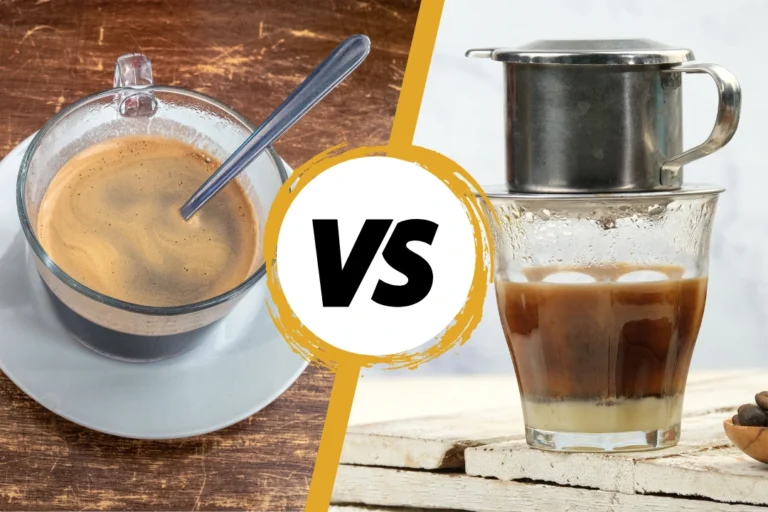When you look at Cuban coffee vs Vietnamese coffee, the first thing you notice is how similar they appear: both are dark, rich, and sweet. Yet once you taste them, the differences become clear. In this post, you’ll learn what makes these two coffees alike, how they differ in preparation and flavor, and which one might suit your taste best.
Shared Traits Between Cuban and Vietnamese Coffee
Before diving into their differences, it’s easy to see why people often compare Cuban and Vietnamese coffee. They share several key traits that set them apart from most other coffee styles.
- Strong flavor: Both use dark roast beans for an intense, full-bodied taste.
- Sweetness: Each version is sweetened as part of the brewing process, not afterward.
- Concentrated brew: Both are served in small portions for a bold, espresso-like experience.
- Cultural importance: Coffee is more than a drink in both Cuba and Vietnam.
- Distinct brewing rituals: Each culture has its own signature brewing tool and pace. Quick and energetic for Cuban coffee, slow and deliberate for Vietnamese coffee.
Cuban Coffee Overview
Cuban coffee is a strong espresso-style drink. It’s prepared in a Moka pot traditionally. What makes it unique is the espuma, or sugar foam.
The foam is then mixed into the rest of the brew, giving the coffee a thick, syrupy texture and deep sweetness. The result is bold and smooth, with a flavor that blends smokiness, caramel, and a hint of bitterness.
Want to see how strong Cuban coffee is? Check out this caffeine breakdown.

Vietnamese Coffee Overview
Vietnamese coffee is a smooth coffee that combines strong drip-brewed coffee with sweetened condensed milk. It’s traditionally made with Robusta beans, known for their intense flavor and high caffeine content.
The coffee is brewed using a small metal filter called a phin, which slowly drips hot water through finely ground coffee into a cup. The condensed milk is added at the bottom before brewing, and the coffee drips directly onto it. The two are stirred together for a creamy, sweet finish.

Cuban Coffee vs Vietnamese Coffee – Brewing Method and Ingredients Comparison
| Aspect | Cuban Coffee | Vietnamese Coffee |
| Brewing Tool | Moka pot | Phin filter |
| Coffee Beans | Arabica or Arabica-Robusta blend | Mostly Robusta beans |
| Sweetener | Sugar whipped into espuma | Sweetened condensed milk |
| Serving Size | Small (1-2 oz) | Medium (4-6 oz) |
| Texture | Thick and syrupy | Creamy and silky |
| Typical Style | Hot | Often iced |
Flavor and Texture Comparison
Cuban and Vietnamese coffee both deliver intensity, but they express it differently.
Cuban coffee is bold, smoky, and caramelized. The whipped sugar gives it a slightly syrupy feel and a balanced sweetness that enhances its dark, roasted flavor. The taste lingers with a smooth finish that’s strong but not bitter.
Vietnamese coffee is rich, creamy, and indulgent. The combination of dark Robusta beans and condensed milk gives it a chocolate-like flavor and a velvety mouthfeel. It’s sweeter and heavier than Cuban coffee, with a lingering richness that feels almost dessert-like.
Which is Stronger
Both Cuban and Vietnamese coffee are known for their strength, but they’re strong in different ways.
Cuban coffee feels stronger when you drink it because it’s highly concentrated and sweetened with whipped sugar.
Vietnamese coffee, on the other hand, has more caffeine overall because it’s typically made with Robusta beans, which naturally contain nearly twice the caffeine of Arabica beans.
When to Choose Each
Both drinks have their moments. It just depends on what kind of coffee experience you want.
- Choose Cuban coffee when you need a bold, sweet kick. It’s perfect for mornings, social gatherings, or moments when you want energy and flavor in a small, concentrated cup.
- Choose Vietnamese coffee when you’re in the mood to relax. The slow drip and creamy texture make it ideal for sipping slowly, whether hot or iced.
FAQ
Is Cuban coffee stronger than Vietnamese coffee?
Cuban coffee feels stronger because it’s more concentrated, but Vietnamese coffee often has more caffeine overall since it uses Robusta beans.
Why are both coffees sweet?
Sweetness is part of their tradition. Cuban coffee is sweetened with sugar whipped into espuma, while Vietnamese coffee uses sweetened condensed milk.
Can I drink Vietnamese coffee without condensed milk?
You can, but it will taste more bitter. The condensed milk balances the dark roast’s natural intensity, so skipping it changes the texture and sweetness.
Which one is better iced?
Vietnamese coffee is perfect iced because of the condensed milk’s creamy texture and balance of sweetness.
Which one has more caffeine?
Vietnamese coffee usually has more caffeine overall because it uses Robusta beans and larger servings.
Key Takeaways on Cuban Coffee vs Vietnamese Coffee
Cuban coffee and Vietnamese coffee may share the same bold personality, but they deliver their flavor and sweetness in completely different ways.
- Cuban coffee is brewed in a moka pot and sweetened with whipped sugar foam (espuma) that creates a caramel-like flavor and syrupy texture.
- Vietnamese coffee is brewed slowly with a phin filter and mixed with sweetened condensed milk for a creamy, dessert-like finish.
- Cuban coffee feels stronger per sip because it’s highly concentrated, while Vietnamese coffee often has more caffeine due to Robusta beans.

